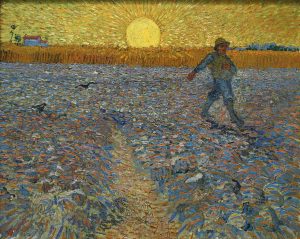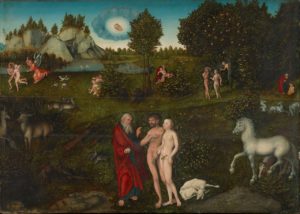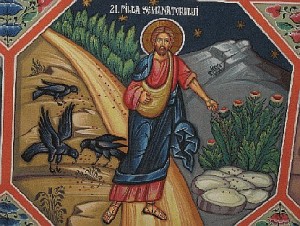Thoughts on Sunday’s Lessons for June 13, 2021
First Reading (Track One): 1 Samuel 15:34-16:13
Saul was named king of Israel amid great hopes, but it hasn’t worked out. To fully grasp the background for Sunday’s Track One first reading, it is helpful to read it in context with the fierce and bloody verses that immediately precede it:

The Sower (1888), oil painting on canvas by Vincent van Gogh (1853-1890). Kröller-Müller Museum, The Netherlands. (Click image to enlarge.)
God had ordered Saul to gather an army and attack the neighboring Amalekites, utterly destroying all that they have and killing all their people and livestock. But against God’s command Saul spared the king and kept the best spoils for himself. Now God, regretting having made Saul king, rejects him and his kingship. In this reading we see God sending Samuel to Bethlehem to find the next king among the sons of Jesse. Much to everyone’s surprise, God passes over seven strong, handsome sons to choose the youngest, David.
First Reading (Track Two): Ezekiel 17:22-24
Can it be only a coincidence that Sunday’s readings point us toward planting, growing, and new life from old, just as the first day of summer draws near? The prophet Ezekiel celebrates the noble cedar, a lofty tree that provides a nesting place for birds and shade for all manner of creatures. Ezekiel is speaking of Israel, reminding the people that God may bring down the mighty nations and raise high the lowly. The prophet’s words offer an inspiring reminder that, with God’s help, a mighty tree can grow from a sprig. In the beauty of creation, we know that God is good.
Psalm (Track One): Psalm 20
Echoing the militaristic themes that surround Israel’s ancient kings and their call to holy war against their neighbors, the Track One Psalm resounds as a prayer for victory. It calls for a blessing before battle, petitioning God to defend the people, send help and strength, accept their offerings and advance their plans. Rather than trusting in chariots and horses, the Psalmist declares, the people shall call on the name of God to give victory to Israel’s king.
Psalm (Track Two): Psalm 92:1-4,11-14
Just as Ezekiel imagined a mighty mountaintop cedar as symbol for Israel, these verses from Psalm 92, a psalm of praise and thanksgiving, show us mighty trees, too: Cedars of Lebanon and tall palm trees stand as metaphors for the people who grow and flourish under God’s nurturing care. Through righteousness – the practice of justice – and faith in God’s lovingkindness, we may remain ripe and fruitful our whole lives long.
Second Reading: 2 Corinthians 5:1-17
The idea of fruitful growth and bountiful harvests may be more subtle in these verses from Paul’s second letter to the church in Corinth, but we can find allusions to the theme in the closing verses. When we choose to live in Christ, everything in our life changes, Paul writes. Just as the leaves fall in autumn and our flowers and gardens die only to return full of life in the spring, everything that is old passes away in Christ’s creation. Everything becomes new for us in the life we gain through Jesus.
Gospel: Mark 4:26-34
Like so many of Jesus’ parables, the two featured in Sunday’s Gospel draw metaphors from seeds and sowing: tiny beginnings that grow up to yield food from the earth. But there’s something else going on: This is Mark’s first account of Jesus using parables to unveil the nature of the Kingdom of God. Mark will tell sixteen more “The Kingdom-is-like” stories in his Gospel’s sixteen chapters. In another recurring theme, Mark shows us Jesus intentionally disguising his mission through mysterious parables, after which he warns his followers to keep his healings secret. Theologians call this “The Messianic Secret,” and wonder why it is so important in Mark’s Gospel. Was Jesus’ call for a Kingdom of God, a kingdom that might replace Roman rule, too dangerous an idea to bring up in public?


